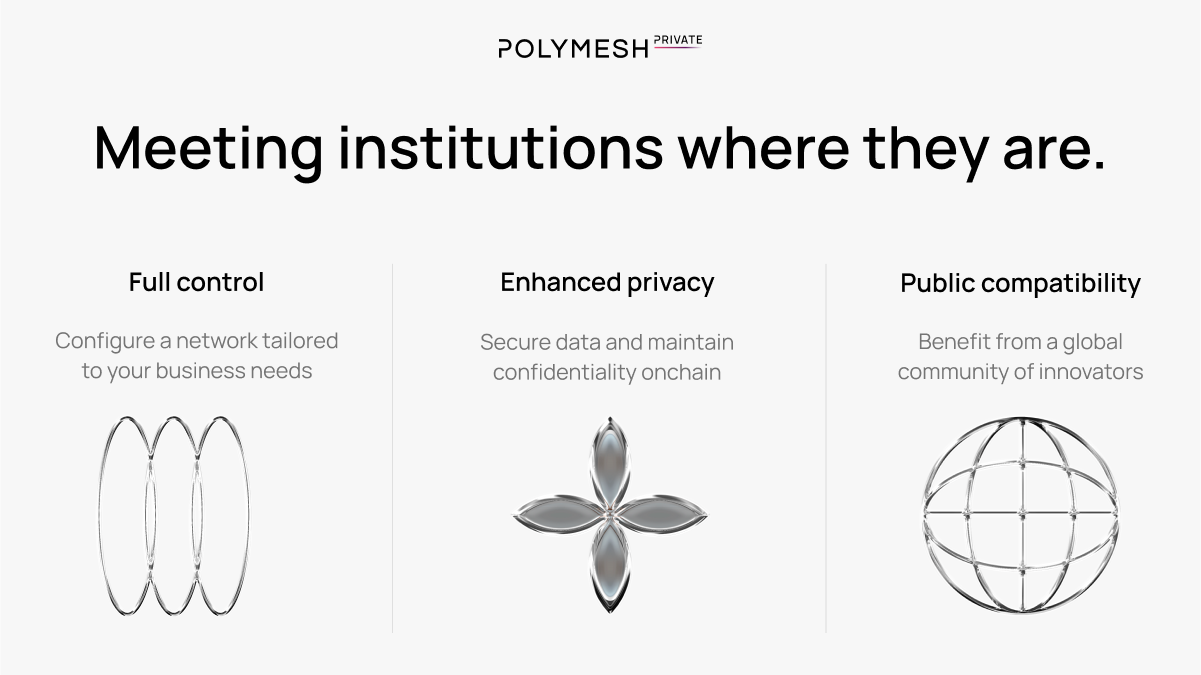How Polymesh Private is bringing new possibilities to the Polymesh ecosystem
In this blog post, we’ll look at what’s unique about Polymesh Private and how it works with the public network to benefit the Polymesh ecosystem and drive institutional tokenization.

Polymesh, the purpose-built blockchain for real world assets, was the first step toward more efficient, automated, and transparent capital markets.
Now, with Polymesh Private, entities wary of public data exposure or concerned with publicly traded utility tokens can interact with Polymesh in their own permissioned environment.
In this blog post, we’ll take a look at what’s unique about Polymesh Private and how it works together with the public network to benefit the Polymesh ecosystem and increase tokenization on behalf of financial institutions.
Polymesh vs. Polymesh Private
What is Polymesh?
Polymesh is a public permissioned blockchain purpose-built for asset tokenization.
Polymesh enables regulatory-compliant issuances and settlement that integrate with existing systems without complex smart contracts. Unlike general-use blockchains, Polymesh features native controls and on-chain governance that prevent network forks and unwanted transactions so businesses, their clients, and regulators can feel at ease.
Polymesh’s simplified workflows for compliant issuance and settlement reduce the complexity and burdens of integrating digital assets into existing systems and enable more efficient, automated, and transparent capital markets.
What is Polymesh Private?
Polymesh Private is streamlining tokenization by enabling privately-run instances of Polymesh that capture the benefits of the public blockchain with enhanced privacy and control.
Polymesh Private is easy to use, configurable per your business needs, and offers enhanced privacy. Data is secured and maintained onchain confidentially with help from Confidential Assets – a feature initially available exclusively to Polymesh Private users.
Today, the vast majority of tokenization by banks and financial institutions takes place on private networks. Polymesh Private meets these players where they are in their tokenization journey while providing a future-proof tech stack that’s compliance-ready and adaptable to the evolving regulatory landscape.
How Polymesh and Polymesh Private work together
Is there chain interoperability between Polymesh and Polymesh Private?
Polymesh Private is your own completely controlled environment. It’s not connected to the public network (at least not in the technical sense).
In the future, interoperability between Polymesh and Polymesh Private instances will enable Polymesh Private instances to tap into the public network, which will drive POLYX utility.
What is public compatibility?
As Polymesh Private uses the same infrastructure as the public network, there is compatibility between the two environments. Public compatibility enables Polymesh Private users to benefit from new features, updates, and tools in the expanding public blockchain ecosystem. It also enables Polymesh Private users to migrate easily to the public network in the future should they wish to transition to using more public, decentralized infrastructure.
How will Polymesh Private benefit the Polymesh ecosystem?
Many institutions cannot use public blockchains for their local environments, either because they’re worried about other onchain actors or because they can’t interact with public tokens. There are also many institutions who would like to integrate with public networks but prefer to wait for the regulatory landscape to evolve.
Polymesh private enables these institutions to integrate Polymesh technology (i.e. the APIs and workflows) in a privately-run and controlled environment. Financial institutions may use Polymesh Private indefinitely, but there will be many who use it in their initial transition to tokenization before switching to the public network later on.
Especially for institutions who would like to eventually use the public Polymesh network, Polymesh Private is the best option because they can seamlessly migrate between the two networks, which is not possible between other, incompatible private and public networks.
For the wider Polymesh ecosystem, public compatibility and future chain interoperability will increase tokenization activity on Polymesh and drive POLYX utility. Integrations with Polymesh Private will also bring attention to Polymesh and bolster its reputation in the wider tokenization space.
Lastly, Polymesh Private provides environments that can be used for initial installment of new features. Certain Polymesh Private exclusive features (e.g. Confidential Assets) are intended to roll out on Polymesh. Having confidentiality functionality deployed in Polymesh Private instances first allows the Polymesh team to perfect these features for real use cases before bringing them to the public chain and interacting with transactions worth millions of dollars.
Looking forward: future-proofing your tech stack
Polymesh Private provides a future-proof tech stack that’s both compliance-ready and capable of seamless public migration. In fact, Polymesh Private is the only private permissioned blockchain that has this capability.
While the private instance initially has certain exclusive features and remains independent of the public network, Polymesh Private instances will undoubtedly contribute to the wider Polymesh ecosystem in a myriad of positive ways. Cementing Polymesh as the leader in public permissioned infrastructure for asset tokenization, Polymesh and Polymesh Private will work together to bring trillions of dollars of real world assets onchain.
To learn more about Polymesh Private, visit polymesh.network/private.

.svg)
